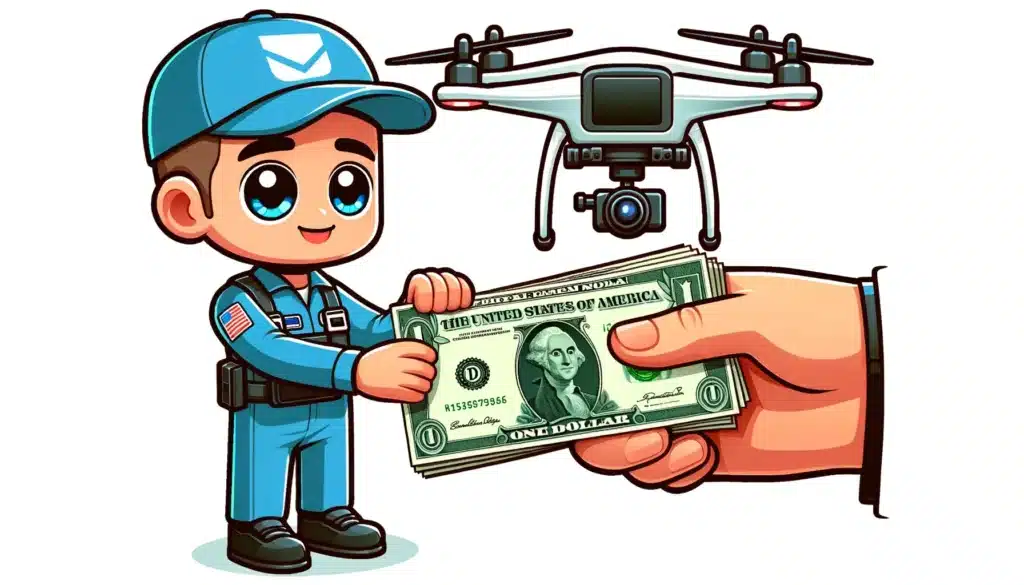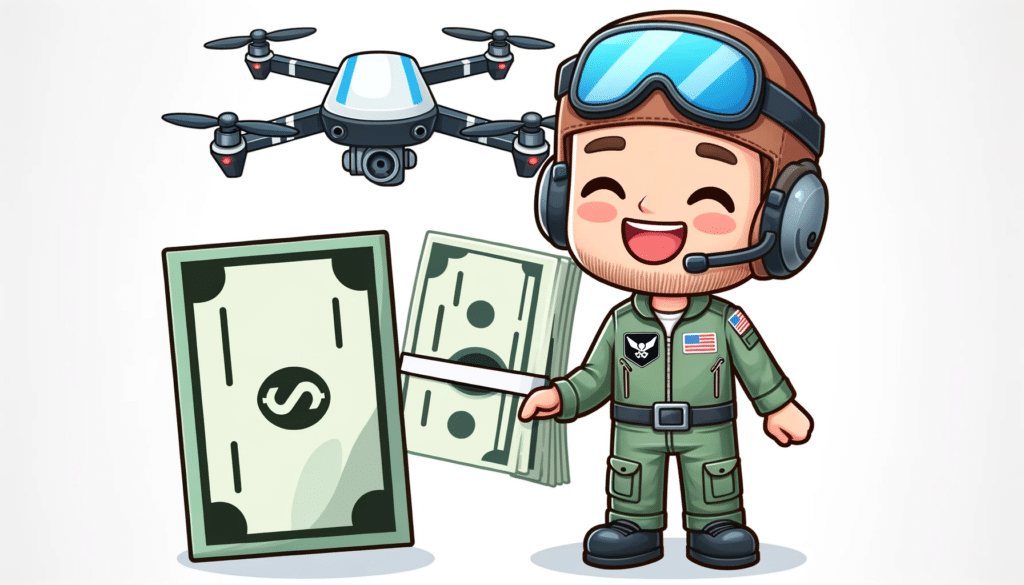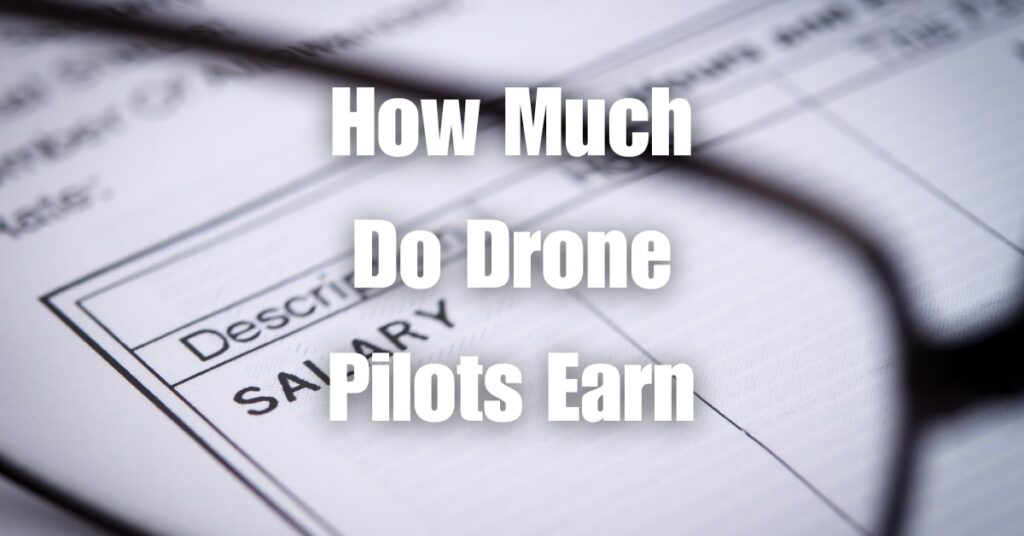Drones have soared in popularity over the past decade, revolutionizing various industries and creating new career opportunities. Among these opportunities is the in-demand profession of drone piloting. But how much do drone pilots make? In this article, we’ll dive deep into the factors that influence the pay scale, average salaries in different industries, and ways to maximize your earning potential as a drone pilot. Whether you’re considering a career change or just curious about this exciting profession, read on to discover the financial rewards that come with flying high.
Key Takeaways
- Drone Pilot Salary Factors: Salary depends on industry, experience, location, and certifications.
- Industry Variation: Different sectors like film, real estate, and agriculture offer varying salaries.
- Experience Impact: More experienced pilots generally earn higher salaries.
- Geographical Differences: Salaries vary based on demand and living costs in different areas.
- Certifications and Education: Additional qualifications can lead to higher earnings.
- Entrepreneurial Opportunities: Business skills enhance income for self-employed pilots.
- Average Industry Salaries: Salaries vary by industry, with film and television offering higher pay.
- Entry-Level Earnings: New pilots earn less, but income grows with experience.
- Career Advancement: Improving skills and networking are key to increasing earnings.

Factors Influencing Drone Pilot Salaries
Several factors determine the salary of a drone pilot. Understanding these factors can help you navigate the industry and maximize your earning potential.
Industry and Applications
The industry in which a drone pilot operates greatly impacts their salary. Different sectors, such as real estate, film, and construction, have varying pay scales and demands for drone pilots. Niche industries may also offer unique opportunities for drone pilots, such as wildlife conservation or emergency response, which can affect earnings.
Experience Level
As with many professions, experience plays a crucial role in determining a drone pilot’s salary. Those with more flight hours, completed projects, and expertise in specialized areas often command higher salaries. Experienced pilots are also more likely to secure long-term contracts or freelance work, leading to increased income stability.
Location
Geographical location is another factor that can influence a drone pilot’s earnings. Some areas have a higher demand for drone services, resulting in higher wages. Additionally, the cost of living in a particular region can impact salary expectations. Major cities tend to have more job opportunities, but they also come with higher living costs.
Education and Certifications
While not always mandatory, having relevant certifications and education can make a difference in a drone pilot’s salary. Certified pilots with specialized training can earn more than those without formal qualifications. Pursuing additional certifications in areas such as thermography, mapping, or cinematography can enhance your marketability and earnings.
Entrepreneurship and Business Skills
Drone pilots who run their own businesses or work as freelancers can have greater control over their income. However, this also requires strong business and marketing skills to attract clients, manage projects, and maintain a sustainable income. Developing these skills can help you increase your earnings as a drone pilot.
Average Salaries for Drone Pilots in Different Industries
Drone pilots can work across various industries, each offering distinct salary expectations. Here’s a breakdown of average salaries in some popular sectors:
Film and Television
Drone pilots working in the film and television industry can earn between $50,000 and $100,000 per year. These pilots often have specialized skills in aerial cinematography and work closely with directors to capture stunning visuals. Salaries can vary depending on the size of the production, the pilot’s expertise, and whether they are employed by a studio or work as freelancers.
Real Estate
Real estate is another lucrative industry for drone pilots. Aerial photography and videography are in high demand for property marketing, and pilots can expect to make between $45,000 and $75,000 per year. Factors such as the size of the real estate market, the number of clients, and the pilot’s experience can influence earnings in this field.
Agriculture
Agriculture has embraced drone technology for crop monitoring, pesticide application, and data collection. Drone pilots in this industry can expect to earn between $40,000 and $70,000 per year, depending on their expertise and the size of the operation. Precision agriculture specialists, who use drones to optimize crop yields and resource management, may earn higher salaries.
Infrastructure Inspection
Drone pilots involved in infrastructure inspection and maintenance services, such as bridges, wind turbines, and cell towers, can earn between $50,000 and $80,000 per year. These jobs often require specialized training and may involve working in challenging environments. Salaries can vary based on the type of infrastructure inspected and the pilot’s experience and certifications.
Search and Rescue
Search and rescue operations increasingly rely on drone technology to locate missing persons or assess disaster areas. Drone pilots working in this field can expect to make between $40,000 and $65,000 per year, depending on their level of expertise and the organization they work for. Salaries can be influenced by factors such as the number of missions, the complexity of the operations, and the pilot’s certifications in specialized areas like thermal imaging or emergency response.
Wildlife Conservation
Drone pilots can also find employment in wildlife conservation efforts, where their skills are used to monitor animal populations, track poachers, or map habitats. Salaries in this sector can range from $35,000 to $60,000 per year, depending on the size of the organization, funding, and the pilot’s experience. Working in conservation may also require a background in ecology or biology, which can influence earning potential.
Surveying and Mapping
Drones are increasingly used for land surveying and mapping projects, particularly in industries like mining, construction, and environmental management. Drone pilots in this field can expect to earn between $45,000 and $75,000 per year. Salaries can be influenced by factors such as the size and complexity of the projects, the pilot’s expertise in mapping software, and the demand for surveying services in a particular region.
How to Boost Your Income as a Drone Pilot
While the factors mentioned above can influence a drone pilot’s salary, there are steps you can take to maximize your earning potential.
Develop a strong portfolio: Showcase your best work and the range of services you offer through an impressive portfolio. This will help you attract clients and secure higher-paying projects.
Pursue additional training and certifications: Invest in your professional development by obtaining specialized training and certifications in your chosen industry. This can set you apart from your competition and lead to better job opportunities and higher earnings.
Network with industry professionals: Building a strong network can open doors to new job opportunities and help you learn from others in the field. Attend conferences, join online forums, and engage with peers to expand your network.
Market your services: Create a professional website, maintain an active presence on social media, and consider local advertising to help you reach potential clients. The more visible you are, the more likely you are to secure new projects and increase your income.
Explore multiple industries: By working across various sectors, you can diversify your income sources and gain experience in different applications of drone technology. This can lead to better job opportunities and help you identify the niche that best aligns with your skills and interests.
Negotiate your salary: When applying for jobs or discussing rates with clients, don’t be afraid to negotiate your salary or fees. By advocating for yourself and demonstrating your value, you can potentially secure better pay and more stable income.
By taking these steps and continuously honing your skills, you can work towards a rewarding and profitable career as a drone pilot.

Entry-Level Drone Pilot Salaries and Making a Living
In this section, we’ll discuss the salary range for entry-level drone pilots and the feasibility of making a living as a drone pilot.
Salary Range for Entry-Level Drone Pilots
Entry-level drone pilots can expect to earn between $30,000 and $45,000 per year, depending on the industry, location, and specific job requirements. As pilots gain experience and build their skills, their earning potential generally increases.
Can You Make a Living as a Drone Pilot?
Yes, you can make a living as a drone pilot, but it may take time to build a sustainable income. As a drone pilot, your earnings will depend on your ability to secure consistent work, develop specialized skills, and excel in your chosen industry. Networking, continuous learning, and marketing your services will play a crucial role in establishing a stable career as a drone pilot.
Highest Paying Drone Jobs
Some of the highest paying drone jobs include:
- Aerial cinematographers in the film and television industry
- Drone pilots working in infrastructure inspection and maintenance
- Drone pilots involved in precision agriculture and data analysis
These positions typically require specialized skills, certifications, and experience, which contribute to their higher pay scales.
How to Become a Drone Pilot
In this section, we’ll explore the steps you need to take to become a drone pilot and the available commercial drone pilot jobs.
Education and Certifications
To become a drone pilot, you’ll need to obtain the necessary certifications and training. In the United States, for example, aspiring pilots must pass the Federal Aviation Administration (FAA) Part 107 exam to obtain a Remote Pilot Certificate. This certification allows you to operate drones commercially and is the foundation for building your career as a drone pilot.
While not always required, obtaining additional training and certifications in specialized areas such as aerial photography, mapping, and thermal imaging can boost your marketability and earning potential.
Commercial Drone Pilot Jobs
There are various commercial drone pilot jobs available across numerous industries. Some examples include:
- Aerial photographers and videographers for real estate marketing
- Film and television drone pilots for cinematography
- Agricultural drone pilots for crop monitoring and data analysis
- Infrastructure inspection pilots for maintenance and assessment of bridges, cell towers, and wind turbines
- Search and rescue drone pilots for emergency operations
By exploring different industries and job opportunities, you can find the niche that best aligns with your interests and skills, setting you on the path to a successful career as a drone pilot.

Specific Drone Pilot Salaries and Job Opportunities
In this section, we’ll discuss specific drone pilot salaries and job opportunities across various sectors and locations.
Amazon Drone Pilot Salary
Amazon has been investing in drone technology for package delivery, aiming to revolutionize the e-commerce industry. While specific salary details for Amazon drone pilots may be confidential, drone pilots working in package delivery can expect to earn between $40,000 and $70,000 per year, depending on their experience, location, and the complexity of the job.
Drone Photographer Earnings
Drone photographers specialize in capturing stunning aerial images for various purposes, including real estate marketing, events, and advertising. These professionals can expect to earn between $45,000 and $75,000 per year, with earnings highly dependent on the number of clients, projects, and their expertise in the field.
Average Drone Pilot Salary in California
In California, drone pilots can expect to earn an average salary of around $60,000 per year. However, this figure can vary depending on the industry, experience, and location within the state. Urban areas with high demand for drone services, such as Los Angeles and San Francisco, may offer higher salaries compared to rural areas.
Drone Pilot Hourly Rates in Texas
In Texas, drone pilots typically charge hourly rates ranging from $50 to $150, depending on their expertise and the complexity of the job. Factors such as industry, experience, and certifications can also influence the hourly rate.
Salary Comparison: Drone Pilots vs. Helicopter Pilots
Drone pilots and helicopter pilots perform different roles and require different skills and certifications. Helicopter pilots often earn higher salaries, with a range of $60,000 to $100,000 per year. However, the cost of training and certification for helicopter pilots is significantly higher, and the job may involve more risk and responsibility.
Part-Time Drone Pilot Jobs Near Me
Part-time drone pilot jobs are available across various industries, such as real estate, event photography, and agriculture. These opportunities allow pilots to build their skills and portfolio while earning supplemental income. Part-time drone pilots can expect to earn between $20,000 and $40,000 per year, depending on the number of projects and the rates they charge.
Drone Operator Jobs for Beginners
Drone operator jobs for beginners include entry-level positions in photography, agriculture, and construction. These jobs provide valuable experience and can help build a strong foundation for a career in drone piloting. As a beginner, it’s essential to invest in relevant certifications, network with industry professionals, and seek opportunities to expand your skills and expertise.
Ways to Increase Your Earnings as a Drone Pilot
In this section, we’ll explore strategies to enhance your earnings and excel in your drone piloting career.
Upskilling and Continuing Education
Investing in continuous learning is essential for staying competitive in the drone industry. Pursuing additional certifications, attending workshops, and enrolling in online courses can help you develop specialized skills and increase your earning potential.
Expanding Your Portfolio
Showcasing your work through a diverse and impressive portfolio is crucial for attracting clients and securing high-paying projects. Regularly update your portfolio with your best work, and consider expanding your range of services to appeal to a broader clientele.
Networking and Marketing
Building a strong professional network can open doors to new job opportunities and help you learn from industry experts. Attend conferences, join online forums, and engage with peers to expand your network. Additionally, marketing your services through social media, local advertising, and word of mouth can help you attract new clients and boost your income.

In summary, the pay scale for drone pilots can vary widely based on factors such as experience, specialization, and geographical location. Understanding these variables can help you navigate your potential earnings and make informed decisions about your career path.
If you’re looking to maximize your earning potential and thrive in the drone industry, consider joining our nationwide pilot network. With zero cost to join, you can start building your business without any financial barriers. Enjoy the freedom of a flexible work schedule, extensive support and training, and a lucrative revenue share model that rewards your efforts significantly more than traditional networks.
By becoming part of our community, you’ll access cutting-edge technology and growth opportunities tailored to your goals, whether you want to operate part-time or expand into a full-fledged business. Take the next step in your drone career by visiting our Pilot Network page and discover how you can elevate your potential in this exciting field.




